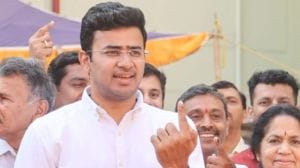- India
- International
New time, old spectre
Shiv Sena, MNS raise Gujarat bogey again ahead of Maharashtra polls. It could backfire.
It’s a rivalry that dates back to the 1950s, when the Samyukta Maharashtra Movement and the Mahagujarat Movement fought for separate states based on linguistic identity and the city of Bombay. Eventually, Bombay became the capital of Maharashtra but the fact that there were other claimants for the city gave birth to a strand of ethnic politics in Maharashtra that continues to be influential. In this nativist narrative, over the years, different groups or communities have been cast in the role of the “Other”. After the Marathis and the Gujaratis made peace, in the 1960s and thereafter, south Indians and Muslims became branded as the outsiders. Now, with the quarter-century-old Shiv Sena-BJP alliance falling apart in the run-up to the assembly election, the older Marathi-Gujarati rivalry seems to be once again taking centrestage.
On Monday, Maharashtra Navnirman Sena (MNS) leader Raj Thackeray accused the BJP, and Narendra Modi, of fostering a hidden agenda of separating Mumbai from Maharashtra. The MNS and the Sena allege that the Centre is shifting key RBI offices from Mumbai to Gujarat in a bid to lower Mumbai’s status as the country’s financial capital. The break-up of the Sena-BJP alliance may have caused the escalation of antagonism, but strands of such rhetoric were visible even earlier, during the Lok Sabha campaign. For instance, Sena mouthpiece Saamna carried a sharp editorial on the occasion of Maharashtra Foundation Day, May 1, accusing the Gujarati community of exploiting Mumbai to build their “dwarakas” elsewhere. The relationship between Modi and Sena founder Bal Thackeray had been, at best, lukewarm — with the latter endorsing Sushma Swaraj for the PM’s office — but with Amit Shah taking over as BJP president, analysts have spotted the shadow of Marathi-Gujarati rivalry in the BJP’s refusal to let the Sena dominate the alliance.
The Sena’s chauvinistic politics, and its nativist slogans evoking the “Marathi manoos”and “Marathi asmita” arguably helped it to differentiate itself from the BJP’s Hindutva appeal. But it may have failed to recognise that in a rapidly changing, young country, it may need to reinvent itself. Over the years, state parties like the TDP, BJD, DMK and AIADMK, Trinamool Congress and even the NCP, have spread beyond their “core” base and tried to, in varying degrees, define themselves as inclusive parties with a regional agenda, instead of merely pitting themselves against an imagined “Other” for electoral gain. A chauvinistic political campaign could backfire if, as in other states, issues of governance influence the election outcome in Maharashtra.
EXPRESS OPINION
More Explained
Apr 26: Latest News
- 01
- 02
- 03
- 04
- 05

































